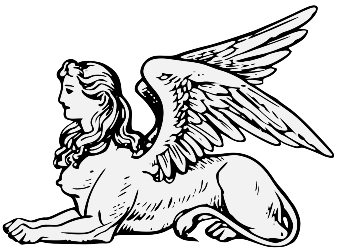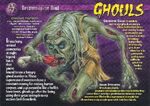According to Middle Eastern mythology, ghouls also known as gholes, goules, ghilan (Arabic:غيلان, singular ghul غول), Ghuls, Namnams, and Namaanim (Arabic: نمانم, singular Namnam نمنم) are evil spirits of the desert.
Able to assume the shape of an animal, ghouls are grave robbers living off the flesh of the dead.
Travelers planning to cross any of the vast deserts or savannas of North Africa, the Middle East, or Central Asia should be aware that ghouls often entice men off the road and confuse them. Once the men are disoriented, the ghouls proceed to feast on their flesh.
Some additional facts[]
Europe[]
A ghoul is a cannibalistic monsters, often thought of as undead in European folklore. They were once human, but they brought the curse on themselves by eating human flesh (dead or alive). They feed on corpses or living flesh, often abducting young children or luring away unwary people into abandoned places.
They are disgustingly ugly and stink of death. They are immensely strong, but geniuses in a sarcastic way, thus tricking them is always a better way than fighting them.
According to the tradition church bells scare away the storm, the plague, the demons, the ghouls and every hostile creature (other than humans).
By extension, the word ghoul is also used derogatorily to refer to a person who delights in the macabre, or whose profession is linked directly to death, such as a gravedigger.
In Greek mytholgy, ghouls are undead cacodemons called Phasma Philinnion
Japan[]
- Main article: Jikininki
Philippines[]
- Main article: Aswang
Arabian folklore[]
In Arabian folklore, a ghul is a terrible, shape-shifting monster. It may appear in the form of a hyena or a hound, opening up graves and devouring corpses. They do not hesitate to eat lonely travelers, who lost their way.
They also hunt for young children, drink blood and steal unattended coins.
In Arabic, the term is sometimes used to describe a greedy or gluttonous individual.
In Islam[]
Ghouls are rarely to be mentioned in Islam, they have never been mentioned in the Quran but they are mentioned in the Hadith but not with the same meaning in Arabian folklore or the pre-Islamic Arabian religion it is for misdirectors or a kind of primate, but even though when they were adopted in Islamic folklore they are sometimes considered as a devilish class of jinni who is believed to be sired by Iblis.













